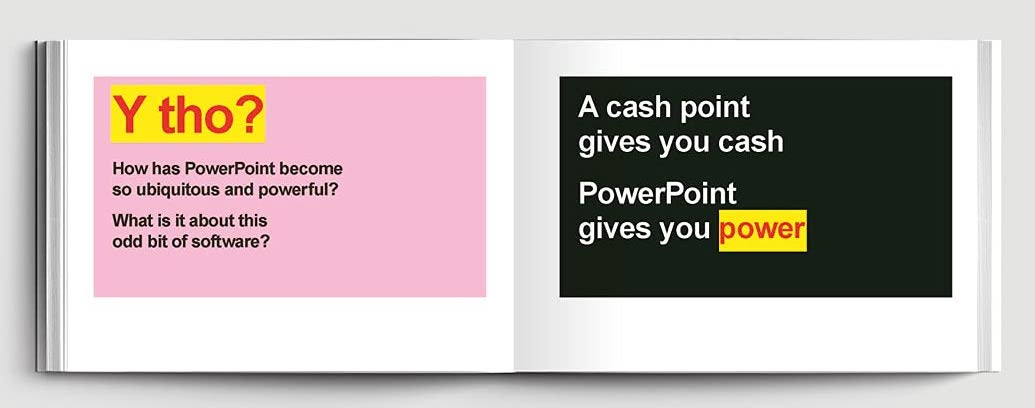#40: PowerPoint to the people
A Q&A with writer and strategist Russell Davies
Hello!
I’m very excited about this week’s Q&A. It’s with writer and strategist Russell Davies, someone I’ve admired for years. It’s quite hard to describe Russell because he does and is interested in so many things. Some of his past times include writing for WIRED magazine, dabbling in DJ-ing, and building a map for London’s BorisBikes. He also writes books, the most recent of which is Everything I Know About Life I l Learned From PowerPoint. Don’t worry, we’ll get into this shortly.
I invited Russell to a Q&A because he’s been on the tech and non-profit side. As a strategist, he’s worked with companies like Nike, Apple, Microsoft, and Honda. He was Director of Strategy for the Government Digital Service, Director of Digital Strategy at the Co-op, and CEO of Doteveryone. He's currently VP of Marketing at Bulb Energy.
He’s also a really nice bloke.
Why did you choose to write a book about PowerPoint?!
Three reasons:
I felt like most other books about PowerPoint just make people more anxious about presenting and set an impossibly high bar.
I was fed up with the mainstream media narrative about PowerPoint. It's all “death by powerPoint” and “Amazon bans PowerPoint.” I wanted to remind us all that PowerPoint is the most creative software tool most people have and that it's democratic, accessible, and liberating. It helps people have a voice. The people who famously 'ban PowerPoint'—typically generals and CEOs—are mostly unthinking about organisational hierarchies. In banning PowerPoint, they're enforcing informal networks of power and creating organisations in their own image.
I'd thought of some good jokes.
You've worked client-side and agency-side, public sector and private sector. Is there a common thread in anything you've learned? If yes, what?
Every organisation is made of people. So they all have the same limitations. Dunbar's number, Hofstadter's law, Fredkin's paradox, the Hedgehog's dilemma, Bikeshedding.
And they all have the same joys. Scenius, agility, comradeship. A shoulder to cry on and a second pair of eyes. And someone to say, "never doubt that a small group of thoughtful, committed citizens can change the world; indeed, it's the only thing that ever has," just when you need to hear it.
What's the biggest impact you had when heading up strategy at the UK Government Digital Service?
That was just a title; I didn't Head Up any meaningful strategy work. I just helped run the team that did the communication stuff. Our biggest impact was making government (and digital) comms a bit more practical and humane via these principles:
No big bangs
Don't announce things till you've done them
Use blog posts, posters, and stickers
Spend no money
Show the thing
What's one thing you wish startups and non-profits understood better about the internet? And why?
I don't think I have just one. Here's a selection:
You can build websites without React
You can understand your users without collecting their data
You can do all sorts with video but you can't explain complex things
Useful trumps delightful, easy trumps useful
How can the tech and non-profit sectors come closer together?
I'm not sure that kind of categorisation is useful. It's about the institution rather than what the people in it are trying to do. Maybe it would be more helpful to start with the problem. For example:
How can people from different kinds of organisations come closer together to fix homelessness? Or the climate emergency or addiction?
Then the common interests become pretty obvious. It's not easy. There's organisational jealousy and Not Invented Here syndrome to overcome. But it's clear what needs to be done. The best first step is probably to understand each other's jargon. Especially the jargon you don't realise you're using.
I would mostly tell tech people:
Non-profits are as smart as you; they're just operating with more constraints.
Make sure you consider all the ways your clever technological idea might make everything worse.
And I would mostly tell non-profits:
Don't be in awe of tech companies: you're a three-week Python course away from 98% of what they know. But that extra 2% is interesting—mostly because Tech's funding model encourages risk, and risk can be instructive.
Which three books or other media have had the most significant impact on you as a leader and why?
LaserWriter II by Tamara Shopsin — A portrait of a workplace built on trust and enthusiasm.
Local Hero by Bill Forsyth — A film about corporations, community, and compromise. And what matters.
The Intuitionist by Colson Whitehead — Buried inside a much bigger and more important story are lovely thoughts about learning through taste vs. learning through data.
You're hosting an event in London in September with no public agenda. Can you give us any clues on what it will be about?
That makes it sounds very sinister! There's no public agenda because there's no agenda at all. It's not till September; we've got plenty of time to work it out. It's a conference called Interesting. So, hopefully, it'll be interesting. I can tell you that, at minimum, we'll have talks about crispy onions, nightwatchmen, and the trains of Eastern Europe.
How can folks stay in touch with you? And why shouldn't they get in touch with you on LinkedIn?
I don't understand LinkedIn. It's like being in an interview 24 hours a day. Exhausting. People can stay in touch with me via my blog or my occasional newsletter.
What’s your PoV on PowerPoint? Have Russell’s arguments made you think differently? Let me know by replying to this email or:
Thanks for reading!
Lauren




Great material Lauren!